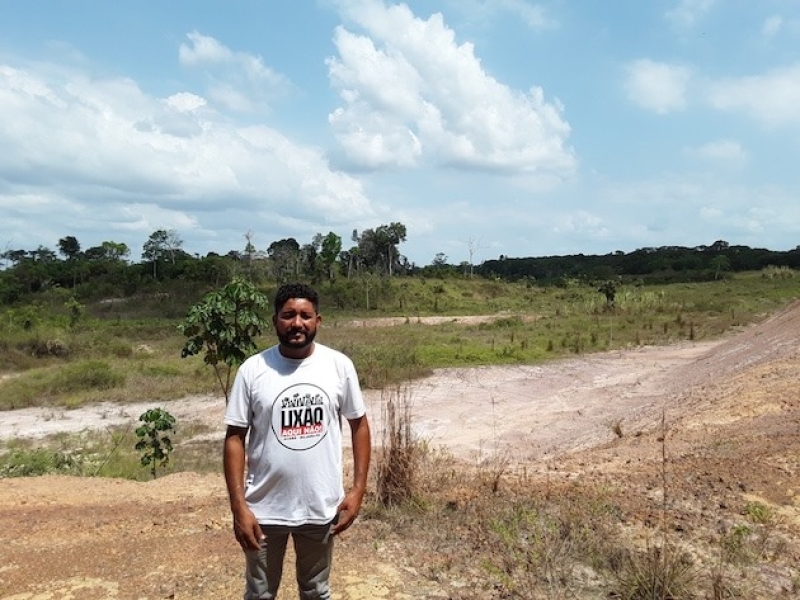- UNGA urges renewed int’l efforts for a resolution of Rohingya crisis |
- First National AI Readiness Assessment Report Published |
- China calls for implementation roadmap for new finance goal |
- New gas reserve found in old well at Sylhet Kailashtila field |
- Revenue earnings shortfall widens in October |
Quilombos Struggle for Rights While Protecting Amazon Forest

Fabio Nogueira, a leader of the Menino Jesus Quilombola Afro-descendant community, stands in front of a proposed landfill, which is 500m from their homes.
Just 30 minutes from where UN climate negotiations are taking place in Belém, Afro-descendant communities are fighting for full recognition and legal titling of their ancestral territories. Their security and livelihoods are increasingly threatened by businesses planning polluting landfill sites and by drug cartels.
A boat ride along the expansive Amazon basin takes you deep into the forest, the world’s largest rainforest, estimated at 5.5 to 6.9 million square kilometers across eight countries.
Within the forest are the Quilombos—communities founded by descendants of Africans who escaped enslavement. These communities have defended their rights for generations. Across Latin America and the Caribbean, they may have different names but share common histories and struggles.
Over 130 million people in Latin America identify as Afro-descendant, descendants of those forcibly brought during the transatlantic slave trade. In Brazil, Ecuador, Colombia, and Suriname, these communities collectively hold recognized management rights to nearly 10 million hectares (24 million acres) of land.
The Amazon is the backdrop for the ongoing struggle for full recognition and legal titling of ancestral territories, as guaranteed by Brazil’s 1988 Constitution.
Fabio Nogueira, a leader of the Menino Jesus Quilombola community, home to 28 families, explained: “Without titles, Quilombolas are exposed to invasion and displacement by companies, ranchers, farmers, and land grabbers.”
Criminal gangs also target these communities and their leaders. Increased surveillance and drug seizures along routes from Latin America to Europe have turned the Amazon into a drug corridor. Drug traffickers use “rios de cocaine” (cocaine rivers), jeopardizing the safety of Quilombos. Many remote areas in Quilombola territories serve as key “cocaine corridors,” and the lack of state presence and legal land titling makes these communities soft targets.
The Amazon is also the scene of a battle against landfills. Landfills in the region contaminate soil and water with heavy metals and other toxins while releasing greenhouse gases like methane. Nogueira said, “We are 15 kilometers from the lixão de Marituba landfill, and it still pollutes our air and environment. Now they want to bring a landfill only 500 meters from our community. We are resisting and have filed a case in court.”
Brazil’s Public Defender’s Office has filed legal action and recommended the project’s suspension, noting that the land is public and part of territory traditionally occupied by the community for over twenty years.
At the current pace, it would take 2,188 years to complete the 1,802 open land titling processes at the National Institute for Colonization and Agrarian Reform. The slow pace of titling negatively affects forest preservation. Studies show that titled Quilombo territories maintain 91 percent of their forests, while non-titled territories preserve only 76 percent.
“Self-declared territories that do not yet have certification experienced forest loss 400 percent higher than titled territories,” said Malungu, coordinator of the Associations of Remaining Quilombo Communities of Pará, which advocates for Quilombola communities in the state.
During COP30, visits to Menino Jesus and Itaco-Miri Quilombos highlighted the importance of communal land titling for well-being and climate goals. Secure land tenure enhances carbon absorption, forest protection, and biodiversity preservation through traditional agriculture.
Over six generations, Quilombola communities have acted as stewards of the Amazon rainforest, preserving biodiversity through sustainable practices. From 1985 to 2022, Quilombo territories lost only 4.7 percent of their original forest cover, compared to 17 percent in private areas.
Political recognition, however, has lagged behind scientific recognition. Shortly before COP30, President Luiz Inácio Lula da Silva visited Menino Jesus and Itaco-Miri communities as part of COP30 preparatory meetings.
For the first time in UN climate convention history, COP30 draft texts included the term “people of African descent,” recognizing their role in climate policy. This inclusion spans documents related to the Just Transition and Gender Action Plan.
The Belém Declaration on Fighting Environmental Racism, joined by 19 countries at COP30, acknowledges the disproportionate exposure of people of African descent, Indigenous peoples, and local communities to environmental harms and climate risks. It aims to foster global dialogue on racial equality, climate change, and environmental justice.
Coelho Teles from the Quilombo community said, “We have been sidelined. We do not know how to get involved or participate in COP30.”
Brazil has also launched the Brazil-led Tropical Forests Forever Facility at COP30 to compensate countries for preserving tropical forests, reserving 20 percent of funds for Indigenous peoples. Quilombo communities stress that their recognition and active participation are essential for the initiative to achieve its conservation goals.

